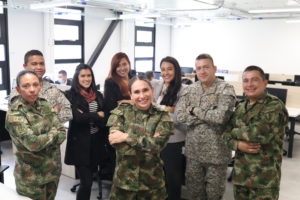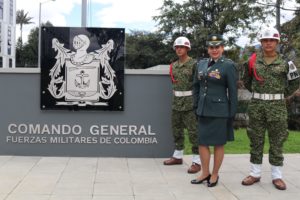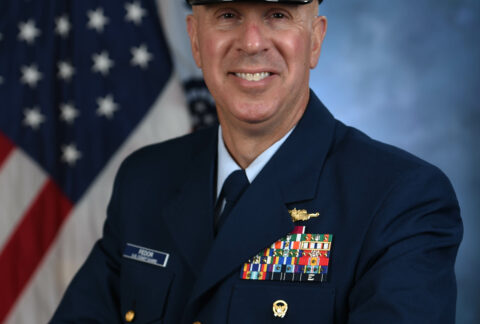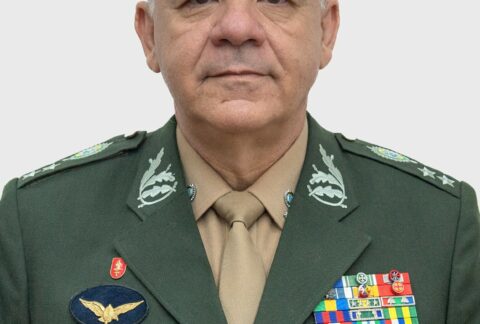When she graduated with a Mass Communications degree (journalist) from the Externado University of Colombia in 1994, young Jhasmin Mora Cuellar knew exactly what she wanted to do in life. That’s why, two years later, she enrolled in the General José María Córdova Military Academy, where she graduated as a Colombian Army officer in the administrative corps, a career that led her to her current position as chief of Strategic Communications at the Colombian Military Forces’ General Command. Prior to that, she served as press officer for the Army’s Fourth Brigade; she was co-founder of the first Counternarcotics Battalion in 1998, where she was part of the Psychological Operations Company with jurisdiction in the south of the country. She held the position of Communications officer for the Army’s Fourth Division, and was later assigned to the War College as editorial director of the Fuerzas Armadas magazine. To learn more about this officer’s career, Diálogo spoke with Col. Mora, whom her fellow brothers and sisters in arms consider to be one of the most competent and professional service members in the Colombian Military Forces.
Diálogo: How do you feel about belonging to a profession, such as the military career, that has traditionally consisted of more men than women in Latin America?
Colonel Jhasmin Mora Cuellar, chief of Strategic Communications at the Colombian Military Forces’ General Command: I feel useful, empowered, with opportunities to work for the security and defense of my country, and on equal terms with men. For me, as a National Army officer, it’s an honor to be part of the Colombian Military Forces. Throughout my 25 years of service, I have directed my work and specialization toward helping achieve the command’s strategic goals, such as social communication; highlighting the work that soldiers do on land, sea, air, and rivers to protect the Colombian people; and contributing information to improve processes that seek progress and development for communities in our country’s most vulnerable regions. In the history of humankind, women have played a fundamental role; we have been the driving force behind different processes, and we have developed great skills that today we make available to the Military Forces of my country. Our strength, imagination, and willpower are crucial to contribute to building a more equitable society for women and men. Women in the Military Forces have gained ground for participation and interaction that are decisive to achieve victory both in the operational theater and in social development and stabilization scenarios in the country.

Diálogo: What unique talents do women bring to the military forces?
Col. Mora: As leaders, many women work in emotional intelligence; we have learned to develop aspects such as motivation and empathy, two important qualities when we serve in roles that seek to generate the best performance by members of a work team. We have trained in different professional, technological, and technical areas, disciplines of knowledge that the Colombian Military Forces require today to fulfill the assigned mission. We are particularly sensitive, versatile, adaptable, committed, [and] disciplined, and we always bring passion to every task. Thanks to all these distinctive features, today the Military Forces have women of different ranks and different specializations who serve in the administrative, health, communications, infantry, logistics, cavalry, and artillery areas, among other specializations, who contribute to achieving the ultimate goal, which is to sustain a great, respected, and free Colombia.
Diálogo: What talents are necessary to be successful in the military field, regardless of gender?
Col. Mora: Without question, human beings must do what we like, what we are passionate about, and therefore, we must first master knowledge, have expertise, achieve assertive communication, be innovative, complement each other in work teams, and always think about the consumer of our product, which in this case is the Colombian people, their security and defense. In this respect, I think that the most important talent our institution requires is the vocation of service, an unreserved love for humankind, and having an inherent higher ethical behavior. This applies not only to being successful in military life, but also in civil and personal matters.

Diálogo: With regard to gender integration, what has changed the most since you joined the Colombian Army?
Col. Mora: The Army and the Military Forces in general have gone through a series of transformations, both generational and in the context of global dynamics, which require rethinking the optimization of human resources; and it is there, precisely, where the Colombian Military Forces have focused a large part of their efforts on positioning and empowering women according to their competencies. Today, the female force in the Colombian Military Forces consists of 9,680 women, of whom 5,223 are military personnel and 4,457 are civilians serving the military institution, which demonstrates the evolution of the incorporation of female personnel, opening a space for them in a traditionally masculine context. The female presence in the Military Forces began in 1976, when the National Army incorporated women into its ranks for the first time. This is how the first officers in the administrative corps entered in areas such as bacteriology, medicine, economics, law, and sociology. This fact became a historic milestone for women in their constant struggle to achieve greater representation in the labor market, as well as a challenge for the military institution, given the fact that the Military Academy had no experience in training women. Continuing with the process of functional female integration, in 2009, the first women who received education and training to be officers of the arms and logistics corps entered the José María Córdova Military Academy. This training took place under the same conditions and requirements as those for men, obviously under a differential approach. The Colombian Navy incorporated the first female officers in the administrative corps in 1984. The Colombian Air Force incorporated the first women into its ranks in 1979. Today, there is a 2018-2027 sectoral public policy for gender mainstreaming for uniformed personnel of the public force, issued by the Defense Ministry. In developing the growing processes for the incorporation of women in the Military Forces, both as civilian and military personnel, seven lines of action were implemented to strengthen the promotion of gender equality: prevention, protection, participation, institutionalization, knowledge, communication, and cooperation.
Diálogo: Do you think women in the military have to work harder, compared to men?
Col. Mora: Definitely not. In the Colombian Military Forces, both women and men have had the same opportunities; it has been a progressive, steady, and satisfactory process, because today we already have talented women who hold the rank of General of the Republic of Colombia. They are great protagonists and leaders who have stood out for their work [and for] their meticulousness and splendor in the tasks they fulfill. Thanks to their knowledge and capabilities, they have empowered women in the Military Forces. It’s important to note that our Military Forces, by recognizing the capabilities of female uniformed personnel and in full respect of military women’s rights and capabilities, have devised gender policies and guidelines that have enabled optimum advances on the path of equality in opportunities and capabilities. Thanks to this cultural reengineering, today in the Army, Navy, and Air Force, we have military women who lead strategic, logistics, operational, and administrative processes.
Diálogo: What do you think of women serving in combat zones?
Col. Mora: Historically, it has been demonstrated that women, by their very nature, their characterization and unique qualities, are innate warriors. Therefore, in the combat field, it has been an eminent support to achieve operational goals in different roles. This warrior dimension makes the woman a guide, a hard-worker, loving, firm, and victorious. In the context and dynamics of the conflict that is being waged in Colombia, female military personnel have been educated and trained; they are a crucial component in the theater of operations, because with their specializations in the branches of military science and their weapons, such as intelligence, communications, logistics, artillery, cavalry, comprehensive action, aviation, infantry, and engineers, among other specializations, they have contributed significantly in this transition from area military control to territorial institutional control.
Diálogo: What is the “new normal” going to be for the Colombian Military Forces when the pandemic ends?
Col. Mora: Day by day, our men and women prepare, train, and build their capabilities to face the new challenges that the global dynamics and national needs present. Clearly, and because of this unrestricted commitment to ensure the well-being of the Colombian people, our soldiers are educated to take on the challenges in the operational theater, as in unarmed effort scenarios, contributing to the development, prosperity, and construction of the country.









